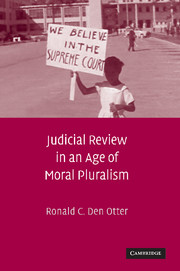Book contents
- Frontmatter
- Contents
- Acknowledgments
- Introduction
- 1 Public Justification and Constitutional Theory
- 2 Freedom and Equality in Constitutional History
- 3 The Challenge of Public Justification
- 4 Competing Conceptions of Public Reason
- 5 Constitutional Public Reason
- 6 The Limits of Public Justification
- 7 Standard Objections to Public Reason
- 8 Easier Cases
- 9 Harder Cases
- 10 The Case for Judicial Review
- Conclusion
- References
- Index
- References
9 - Harder Cases
Published online by Cambridge University Press: 17 December 2010
- Frontmatter
- Contents
- Acknowledgments
- Introduction
- 1 Public Justification and Constitutional Theory
- 2 Freedom and Equality in Constitutional History
- 3 The Challenge of Public Justification
- 4 Competing Conceptions of Public Reason
- 5 Constitutional Public Reason
- 6 The Limits of Public Justification
- 7 Standard Objections to Public Reason
- 8 Easier Cases
- 9 Harder Cases
- 10 The Case for Judicial Review
- Conclusion
- References
- Index
- References
Summary
In the previous chapter, I explained why Yoder and same-sex marriage are relatively easy because those on the wrong side use nonpublic reasons to underwrite their respective positions. What is missing from their accounts is an explanation of why an ideal reasonable dissenter would not reject their reasons. In enacting public laws, everyone has a very good reason not to act for certain reasons, namely those based on their deepest convictions, provided that others do likewise, and the Court must ensure that lawmakers do not rely on those kinds of reasons. In the case of religious freedom, the state may not rely on judgments about religious practices and ways of life on the merits, and there should be a strong presumption in favor of free exercise of religion and in favor of personal freedom more generally. In the case of same-sex marriage, moral disapproval of same-sex intimacy or reasons closely related to this view should not serve as the basis of denying marriage licenses to gays and lesbians. The cases of Yoder and same-sex marriage would have been more difficult if both sides had offered sufficiently public reasons of more or less equal strength.
In this chapter, I explain how a judge, who is committed to public justification, should go about deciding harder cases, namely those involving affirmative action and abortion, and then I use the difficulty of those cases to illustrate the limits of public justification.
- Type
- Chapter
- Information
- Judicial Review in an Age of Moral Pluralism , pp. 262 - 290Publisher: Cambridge University PressPrint publication year: 2009



